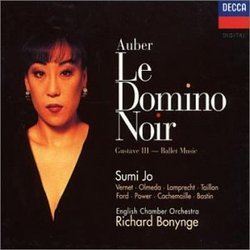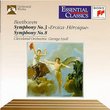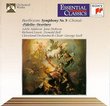| All Artists: Daniel-Francois-Esprit Auber, Richard Bonynge, English Chamber Orchestra, London Voices, Sumi Jo, Bruce Ford, Isabelle Vernet, Patrick Power, Martine Olmeda, Jules Bastin Doris Lamprecht Title: Auber - Le Domino Noir / Sumi Jo ˇ Vernet ˇ Ford ˇ Power ˇ Olmeda ˇ Lamprecht ˇ Bastin ˇ Cachemaille ˇ ECO ˇ Bonynge Members Wishing: 0 Total Copies: 0 Label: Polygram Records Release Date: 4/9/1996 Genre: Classical Style: Opera & Classical Vocal Number of Discs: 2 SwapaCD Credits: 2 UPC: 028944064629 |
Search - Daniel-Francois-Esprit Auber, Richard Bonynge, English Chamber Orchestra :: Auber - Le Domino Noir / Sumi Jo ˇ Vernet ˇ Ford ˇ Power ˇ Olmeda ˇ Lamprecht ˇ Bastin ˇ Cachemaille ˇ ECO ˇ Bonynge
 | Daniel-Francois-Esprit Auber, Richard Bonynge, English Chamber Orchestra Auber - Le Domino Noir / Sumi Jo ˇ Vernet ˇ Ford ˇ Power ˇ Olmeda ˇ Lamprecht ˇ Bastin ˇ Cachemaille ˇ ECO ˇ Bonynge Genre: Classical
|
Larger Image |
CD DetailsSimilar CDsSimilarly Requested CDs |
CD ReviewsPure musical pleasure Kicek&Brys | USA/UK | 02/06/2002 (5 out of 5 stars) "This might not be the most profound music ever written but few recordings give as much sheer, unadulterated pleasure as this one. Even if Auber doesn't explore any great depths of feeling, he certainly manages to convey one emotion better than most other composers: pure joy. This set is a delight from beginning to end. Daniel-Francois-Esprit Auber is probably most famous in the history books for "La Muette de Portici" (or "Masaniello" as it is sometimes called), which played an important role in the development of French 'grand opera' (and, incidentally, in the creation of Belgium - inspired by the patriotic arias in a production of this opera in Brussels in 1830, discontented local students took to the streets and rioted against the Dutch authorities, an act which was soon to culminate in the country's independence from the Kingdom of the Netherlands. So perhaps Auber was responsible for the most influential 'political' music ever written!). But Auber is probably at his best in his lighter 'operas comiques', which were wildly successful with Parisian audiences - "Le Domino Noir" notched up 1209 performances between its premiere in 1837 and 1909. The style is perhaps most reminiscent of Rossini, but it has a more dancelike, 'bouncy' feel to it, with infectious, toetapping rhythms driving the music irresistibly along, except in the more lyrical love music. It was Rossini himself who described Auber's style as 'petite musique d'un grand musicien' ('minor music by a major composer'), since Auber was no amateur but a highly educated musician who chose to exercise his talents on lightweight music. He would often give his operas 'local colour': in 'Le Cheval de Bronze' it was Chinese music, in 'Les Diamants de la Couronne', Portuguese. Here there is a distinct Spanish flavour, complete with castanets in the heroine's show-stopping "Aragonaise". Auber also differentiated the music of each act - the first, a masked ball, is predominantly made up of dance music, including a bolero; the second act is a late night party with rousing drinking songs and choruses; finally, in the third act, set in a convent, there is even a 'religious' feeling to some of the music, with organ accompaniment. It's impossible to imagine a livelier, more sympathetic performance of this opera than this recording. The singers are uniformly excellent, even if they are not all well-known names. Just the right amount of Scribe's extensive dialogue has been left in between the musical numbers and it is sparkingly performed (and as an added bonus, a few recitatives have been inserted, composed by Tchaikovsky especially for a late nineteenth century Russian production). The Bonynge-Jo team went on to record another 'opera comique', Adam's "Le Toreador", which is only slightly less successful than "Le Domino Noir". They should definitely follow it up with further examples from this genre: more Auber would be great, or how about Herold's "Zampa", famous for its overture, but yet to be treated to a complete recording? (Brys)" Sometimes it is enough to be tuneful, graceful & light... J. E. ASENCIO-NEGRON | Guaynabo, Puerto Rico USA | 07/15/2000 (4 out of 5 stars) "Daniel-François-Esprit Auber achieved lasting successes with such works as "Fra Daviolo" (1830), "Le Domino noir" (1837: 1,209 performances up to 1909), and "Les Diamants de la couronne" (1847). All of them in the genre "opéra-comique". This opera: "Le Domino noir", it is sparklingly tuneful, immediately pleasing to ear, with a captivating grace and wit; the orchestration is masterfully crafted to please the Paris' audiences of the 19th century (he never leaves unattended the counterpoint and the harmony in his compositions).I enjoyed the "ronde aragonaise" (CD 1, Track 17) sung by Sumi Jo with shinning musicality & bringing her technical brilliance to the role of Angèle. The overture hint us to the spanish flavor of the opera which is at its best on Act II: the "couplets" de Jacinthe, the "réveillons" ensemble, the "rondo" mentioned above, and the "couplets" de Gil Pérez. In Act III, Angèle's aria: "Je suis sauveé enfin... Ah! quelle, nuit!" (I am save at last... Ah! what a night!) (CD 2, Track 4), which is a "tour de force" for the soprano (Sumi Jo), as well as the chorus of nuns: "Ah! quel malheur our nous! (Ah, what a misfortune for us!) (CD 2, Track 6), are very good displays of light humor focused against certain religious attitudes of 19th century.This Auber's composition will entertain you without being as emotionally deep as Verdi & Donizetti. Sometimes it is enough to be tuneful, graceful, elegant and light..." A great mystery M. Ramos | 11/16/1999 (5 out of 5 stars) ""Le Domino Noir" is such a delightful, elegant and utterly irresistible opera that one wonders why it's not perform with more frequency. Recordings such as this, filled with élan and joie de vivre reminds one of the effects of fine champagne and further proves that when it comes to elegance and charm, no one can hold a candle to the French. A delightful recording of a gem of an opera, which judging by the results, was as fun to perform and record as it is to hear. Bonynge is most assuredly in his element. ""
|

 Track Listings (24) - Disc #1
Track Listings (24) - Disc #1








